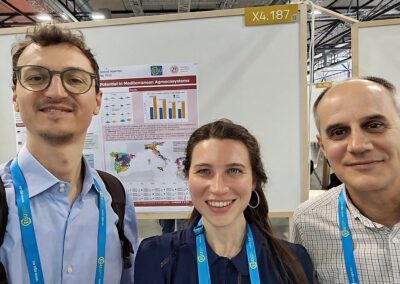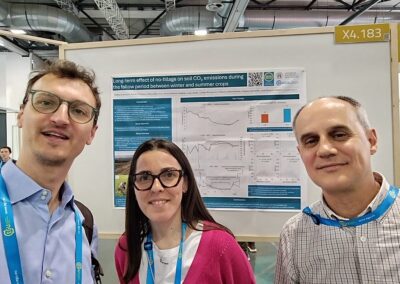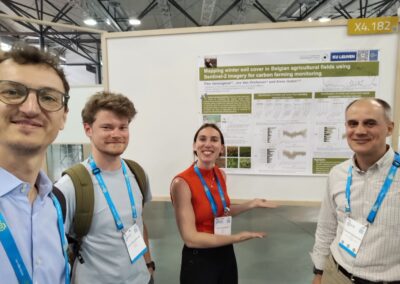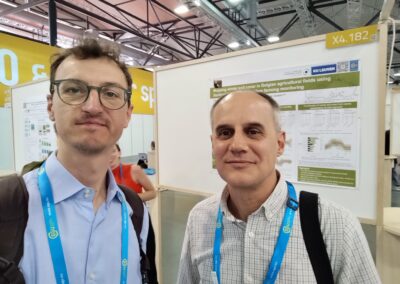“Solve the Challenge” Awareness Campaign
Last month and within the 2025 awareness campaign on environmental governance, our Mission’s project CARBON 4 SOIL QUALITY wrote this article, emphasizing how local actions can be connected to international frameworks. The project took part in the European Geosciences Union (EGU) General Assembly 2025 and promoted the direct link between scientific research, practical solutions and policy decisions.
Carbon farming for a climate-resilient Mediterranean: Our contribution to the European Geosciences Union (EGU) General Assembly 2025
The Mediterranean region is warming 20% faster than the global average, putting additional pressure on already vulnerable ecosystems and societies. Agriculture, in particular, is both deeply affected by climate change and plays a key role in mitigating climate change. Carbon farming is the new frontier for sustainable agricultural systems. It focuses on managing the entire carbon cycle at the farm level— and includes soils, crops, livestock and greenhouse gas emissions such as carbon dioxide (CO₂), methane (CH₄) and nitrous oxide (N₂O).
This year, our Carbon4SoilQuality project made a proud contribution to the European Geosciences Union (EGU) General Assembly 2025, the largest geosciences event in Europe. We took an active role in organising a dedicated session entitled “Carbon farming in Mediterranean climates”. It was the only event at the conference to tackle this critical topic, driving the global discussion on how agriculture can help curb climate change.
The session brought together scientists and experts to present solutions and real-world examples of carbon farming. Topics included:
- Innovative practises in livestock and field management and broader approaches across the agricultural supply chain;
- New technologies for on-farm carbon monitoring, including modelling, near and remote sensing and soil mapping, greenhouse gases (GHG) flux measurements;
- Long-term sustainability verifications at field and territorial level and the economic and social impacts of carbon farming.
“One of the most interesting insights – say Prof. Nicola Dal Ferro – was the diversity of focus across the proposed research. Rather than centering on a single theme, the contributions explored a broad range of topics – for example, spatial mapping of SOC monitoring instead of modeling approaches, or the role of cropping systems in reducing GHG emissions rather than solely emphasizing SOC sequestration potential across different pedo-climatic conditions. This multifaceted perspective aligns closely with the goals of the Carbon4SoilQuality project, with which we are collaborating across the entire supply chain to develop a comprehensive ‘Toolbox for Carbon Farming’.”
The high level of interest in this topic was reflected in the eight abstracts presented in our session, which involved over 50 authors and co-authors. Carbon farming was also discussed in several other thematic sessions at the Assembly, demonstrating its growing importance.
The debate emphasised the urgent need to bridge the gap between scientific knowledge and the practical implementation of techniques that are adopted by farmers and practitioners and supported by policy makers in the Mediterranean region.
“What struck me most in the international debate – continues Prof. Dal Ferro – was the deeply rooted human drive for discovery, and how passionately so many scientists dedicate themselves to research. I was particularly inspired by the emphasis on applied research—such as the work being done on Carbon Farming—where scientific knowledge is actively translated into practical solutions. It’s encouraging to see this collective effort aimed at addressing the major environmental and societal challenges we face, both now and in the near future.”
As part of the Carbon4SoilQuality project, we have contributed to this by developing knowledge-based tools, materials and guidance that form the basis for the implementation of carbon farming practices. These results will help farmers, advisors and decision makers to understand the specific conditions, opportunities and challenges of applying carbon farming in the Mediterranean context.
By presenting solutions and real-life examples of carbon farming, we have helped to demonstrate how regionally tailored insights can lead to more informed, scalable governance models. Our work emphasised the crucial role that context-sensitive preparation plays in ensuring that future policies and incentive schemes are aligned with the actual needs and capacities of agricultural actors in the region.
The EGU General Assembly 2025 itself was a remarkable event, bringing together 20.984 participants, most of them in person, in Vienna. A total of 18.934 presentations were given, more than half of which were contributed by early career scientists.
“Events like EGU 2025 are incredibly valuable for early career scientists, as they provide not only the opportunity to share and receive feedback on their own research, but also to engage with diverse scientific perspectives from around the world. These experiences help young researchers better understand the direction in which science is evolving, while also fostering both professional development and personal growth” (Nicola Dal Ferro)





